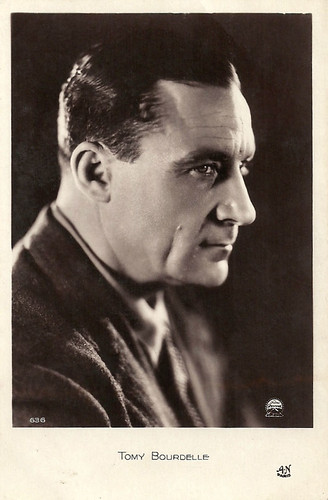
French postcard by A.N., Paris no. 857. Photo: Film H. Diamant-Berger. Thomy Bourdelle as Porthos in Les Trois mousquetaires/The Three Musketeers (Henri Diamant-Berger, 1932).
French postcard by CE (Cinémagazine-Edition), no. 859. Photo: Paramount.
Sea Fever
Thomy Charles Bourdel was born in Paris in 1891. Not much is known about Bourdelle’s private life, but his filmography is interesting.
In 1922, he made his film debut for Pathé Film in the silent war drama L'aiglonne (Émile Keppens, René Navarre, 1922), followed by the comedy Le Taxi 313 X 7 (Pierre Colombier, 1922). Other silent films in which he appeared were L'auberge rouge/The Red Inn (Jean Epstein, 1923), Les Fiancailles Rouges/Red Engagement (Roger Lion, 1926) with Dolly Davis, and the experimental drama En Rade/Sea Fever (Alberto Cavalcanti, 1927) with Catherine Hessling.
Hal Erickson at AllMovie: “Although well photographed on genuine locations, Sea Fever proved confusing to many non-French filmgoers.”
Bourdelle played a German officer in the war film Verdun, visions d’histoire (Léon Poirier, 1928) starring Albert Préjean.
James Travers reviews the film at Films de France: “Verdun, visions d’histoire is markedly different from previous artistic endeavours made in France on the subject of WWI. For one thing, it doesn’t attempt to apportion blame for what happened, nor does it demonise the German people. Instead, what it delivers is an authentic reconstruction of the battle of Verdun, showing the obscene folly of war without over-dramatising it, to provide a stark plea to future generations never to go down the same path again.“
French postcard by Editions Cinemagazine, no. 556. Photo: Thomy Bourdelle as The German officer in Verdun, visions d'histoire (1928).
French postcard by Editions Cinémagazine, no. 554. Photo: José Davert as The Old Farmer in Verdun, visions d'histoire (1928).
French postcard by Editions Cinémagazine, no. 550. Photo: Pierre Nay as The Son in Verdun, visions d'histoire (1928).
Fantomas
Thomy Bourdelle had a fine start in the sound era with a supporting part in the relaxed melodrama Sous les toits de Paris/Under the Roofs of Paris (René Clair, 1930), one of the first French films shot in sound.
Craig Butler at AllMovie: “From the moment Roofs opens, with a tracking shot that takes the audience from above the roofs of Paris and down into a working-class district of the city, it's clear that the film is in the hands of a master, and Clair has plenty of other tricks up his sleeve to keep the viewer engaged.”
Bourdelle also appeared in Clair’s romantic comedy Quatorze Juillet/14th of July (René Clair, 1932) about the festivities on this French holiday. He then played detective Juve who dedicates his life to bringing hooded, black-clad criminal Fantomas to justice in Fantomas (Paul Fejos, 1932), with Jean Galland stars as the elusive ‘hero’. Other popular films were the lavish costume adventure Les Trois Mousquetaires/The Three Musketeers (Henri Diamant-Berger, 1932), Pecheur D'Islande/Iceland Fisherman (Pierre Guerlais, 1933), a rugged drama set in Iceland, and the romantic drama Maria Chapdelaine/The Naked Heart (Julien Duvivier, 1934), featuring Madeleine Renaud.
In Great Britain, he appeared in the detective films Seven Sinners (Albert de Courville, 1936) and Doomed Cargo (Albert de Courville, 1936), both with Edmund Lowe and Constance Cummings. At the Ufa studios in Berlin, he played in the French-German biographical film Adrienne Lecouvreur (Marcel L'Herbier, 1938) starring Yvonne Printemps. The film was based on an 1849 play about the life of the eighteenth-century actress Adrienne Lecouvreur.
From then on Bourdelle’s films became less prolific. Among his later films are La Fête à Henriette/Henriette (Julien Duvivier, 1952) and Le Retour de Don Camillo/The Return of Don Camillo (Julien Duvivier, 1953). He finished his cinematic career with the psychological drama La Tête Contre les Murs/The Keepers (1958), director Georges Franju's first purely fictional film. Thomy Bourdelle died in Toulon, France in 1972. He was 79.

French postcard by A.N., Paris, no. 636. Photo: Paramount.
Sources: Hal Erickson (AllMovie), James Travers (Films de France), Craig Butler (AllMovie), Wikipedia and IMDb.
This post was last updated on 24 July 2023.
No comments:
Post a Comment